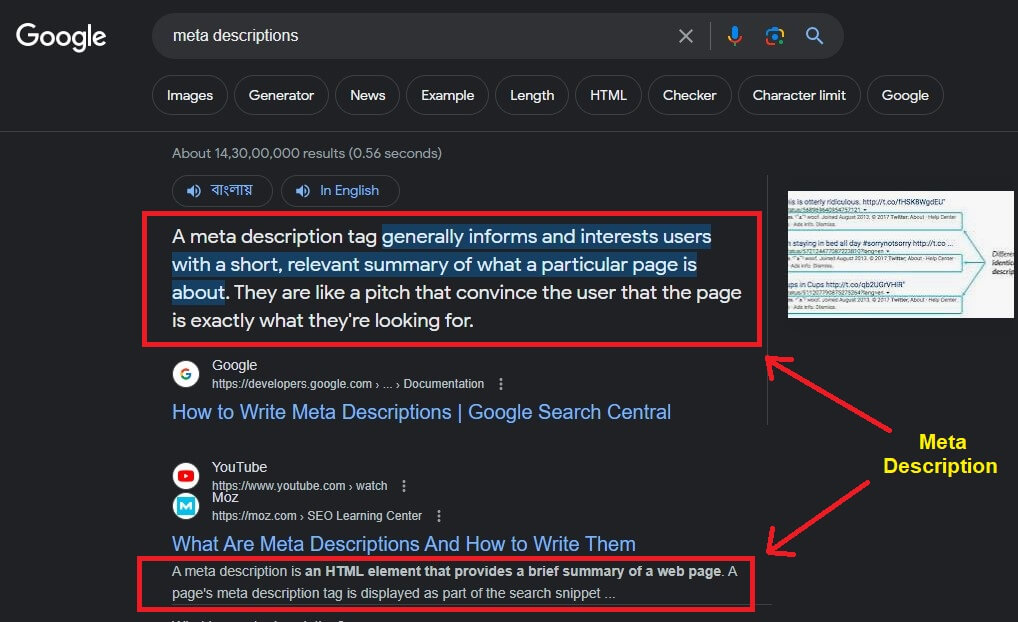For e-commerce sites, Meta descriptions are an important part of SEO. Meta descriptions provide search engines with key information about what a page is about and can be used to help improve your rankings in the SERPs. They also give potential customers more insight into what they will find on your website, which can help drive conversions.
In this guide, we’ll look at the 10 best practices for creating effective Meta descriptions for ecommerce SEO.

1. Make Your Descriptions Unique:
It’s important to make sure that each page has a unique description that accurately reflects its content. Search engines prioritize pages with original content and penalize those with duplicate or thin content, so it’s essential to avoid copy-pasting the same Meta description on multiple pages.
2. Use Keywords:
Including relevant keywords in your Meta descriptions helps search engines better understand what your page is about, which can boost its rankings in the SERPs. Try to include natural-sounding phrases that accurately reflect the content of your page and match up with common user queries.

3. Keep It Short:
Meta descriptions should be kept succinct, ideally within 160 characters or less. Longer descriptions may get cut off in search engine results, so it’s important to make sure that the most important information is included first and foremost.
4. Focus On Benefits:
Rather than simply listing features of a product or service, focus on highlighting its benefits to potential customers and why they should choose you over your competitors. This can help drive conversions by encouraging people to click through.
5. Include A Call To Action:
Adding a call to action in your Meta description is a great way to encourage people to take the next step and visit your site. As an illustration, incorporating phrases such as “Click here to learn more” or “Shop now for the best deals.”

6. Add Some Personality:
Meta descriptions don’t need to be overly formal – you can add some personality and flair by using humor or language that reflects your brand identity. Just make sure it still accurately reflects the content of your page.
7. Address Your Audience:
You should address your potential customers directly in Meta descriptions, using terms like “you” and “your.” This will make them more likely to click on your listing and visit your website.
8. Don’t Overstuff Keywords:
It’s important not to overstuff keywords in Meta descriptions as this can look spammy and detract from their overall quality. Instead, focus on including natural-sounding phrases that accurately reflect the content of each page.
9. Include Relevant Links:
Adding relevant links within your Meta description can be a great way to direct users to other pages on your site where they may find more helpful information or products. Just make sure that the links are relevant to the page’s content and add real value to your customers.
10. Monitor Your Results:
Finally, it’s important to monitor the performance of your Meta descriptions by analyzing click-through rates (CTRs) and other metrics. This can help you identify which ones are working well and which need to be tweaked or rewritten for greater success.

These 10 best practices will help you create effective Meta descriptions for ecommerce SEO that boost rankings and drive conversions. Keep these tips in mind as you craft new descriptions for your site, and don’t forget to monitor their performance to get the most bangs for your buck!
FAQs:
Q: What is the best length for Meta descriptions?
A: Meta descriptions should be kept succinct, ideally within 160 characters or less. Longer descriptions may get cut off in search engine results, so it’s important to make sure that the most important information is included first and foremost.
Q: How can I improve my Meta description CTR?
A: You can improve your Meta description CTR by focusing on benefits rather than features, including a call to action, adding some personality, addressing your audience directly, and monitoring your results. These tips can help you create effective Meta descriptions that boost rankings and drive conversions.
Conclusion:
Meta descriptions are an important part of SEO, as they can help draw users to your website and boost rankings in search engine results. Following these 10 best practices for creating effective Meta descriptions for ecommerce SEO will help you get the most out of this powerful marketing tool. Keep these tips in mind when crafting new descriptions and you’ll be well on your way towards higher rankings and more conversions!





























